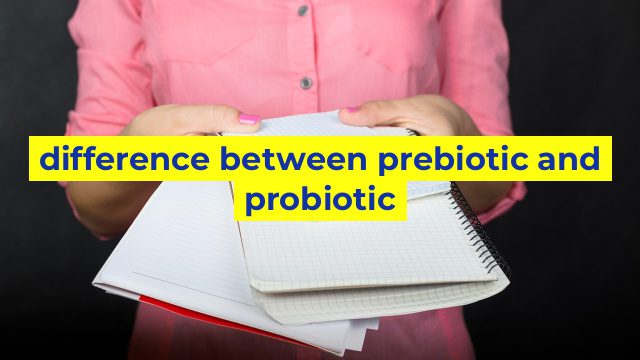The Difference Between Prebiotic and Probiotic
What are Probiotics?
Probiotics are live microorganisms that can be consumed through fermented foods or supplements. They consist of ‘good’ bacteria that can help to improve gut health, boost the immune system, and support overall digestive function. Common strains of probiotics include Lactobacillus, Bifidobacterium, and Streptococcus.
What are Prebiotics?
Prebiotics, on the other hand, are a type of fiber that cannot be digested by the human body. They act as food for the bacteria living in the gut, promoting the growth and survival of ‘good’ bacteria. Prebiotics are found in foods such as onions, garlic, asparagus, and bananas.
The Main Differences Between Prebiotics and Probiotics
While prebiotics and probiotics both offer significant benefits for gut health, they have different mechanisms of action. Probiotics help to introduce new strains of bacteria to the gut, while prebiotics support the growth of existing ‘good’ bacteria.
Additionally, probiotics are living organisms and have a limited lifespan. Prebiotics, on the other hand, are not live bacteria and are not affected by factors that can influence the survival of probiotics, such as stomach acid.
The Benefits of Prebiotics and Probiotics
Research has shown that consuming prebiotics and probiotics can have numerous benefits for overall health. These benefits include:
– Improved digestion and nutrient absorption
– Reduced risk of certain diseases and infections
– Boosted immune system function
– Enhanced mental health and cognitive function
Conclusion
Prebiotics and probiotics are two types of dietary supplements that can help to improve gut health, boost the immune system, and support overall health and wellbeing. While they work in different ways, both are important for optimal gut function and overall health. To maximize the benefits of prebiotics and probiotics, it’s important to consume a diverse range of both types of supplements and to maintain a healthy diet and lifestyle.
Table difference between prebiotic and probiotic
| Prebiotic | Probiotic |
|---|---|
| Non-digestible food ingredients that promote the growth and activity of beneficial bacteria in the gut | Live microorganisms that confer a health benefit on the host when consumed in adequate amounts |
| Examples include fiber, inulin, fructo-oligosaccharides (FOS), galacto-oligosaccharides (GOS) | Examples include lactobacillus, bifidobacterium, streptococcus, saccharomyces boulardii |
| Prebiotics are not living organisms | Probiotics are living organisms |
| Prebiotics provide food for probiotics and other beneficial bacteria in the gut | Probiotics help to restore and maintain a healthy balance of bacteria in the gut |
| Prebiotics can be found naturally in certain foods, such as onions, garlic, asparagus, bananas, oats, and chicory root | Probiotics can be found in fermented foods, such as yogurt, kefir, kimchi, sauerkraut, and kombucha, as well as in dietary supplements |
| Prebiotics may help to reduce inflammation, improve digestion, boost immune function, and promote weight loss | Probiotics may help to prevent and treat diarrhea, reduce symptoms of irritable bowel syndrome (IBS), improve mental health, and enhance oral health |
